More cases being resolved in cyberspace
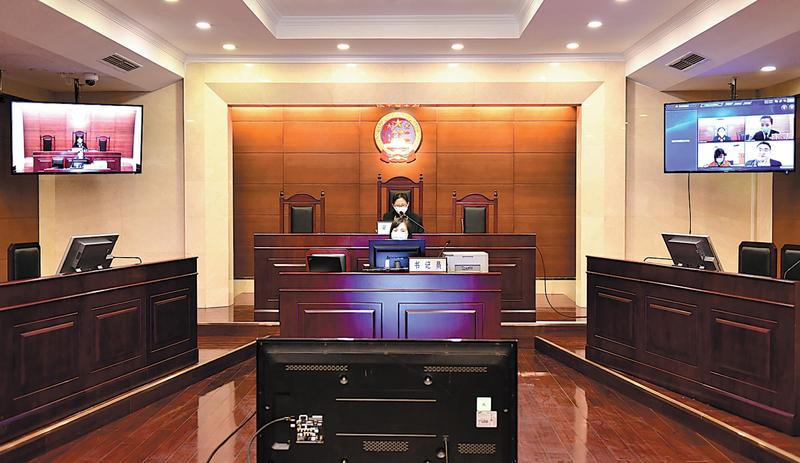 An online hearing involving a case of disturbing public order is held at Beijing Chaoyang District People's Court. (CAO LU / FOR CHINA DAILY)
An online hearing involving a case of disturbing public order is held at Beijing Chaoyang District People's Court. (CAO LU / FOR CHINA DAILY)
Ren Liying, a lawyer involved in an intellectual property case, was worried when the hearing was postponed due to the novel coronavirus pneumonia outbreak, as she feared a lengthy delay.
However, an online platform was quick to solve the problem.
On Feb 26, Ren, from the Zhongmian Law Firm, took part in a hearing organized by Beijing Haidian District People's Court via her laptop at home. The case involved a trademark dispute.
A few days before the hearing, she downloaded the online platform Yunfating, which literally means "hearing in the cloud". Developed by Beijing Municipal High People's Court after the outbreak emerged, the platform has undergone technical tests. Ren also submitted her identify card to the district court for verification online.
"Last year, two hearings for the case were held, so most of the evidence had already been exchanged. As a result, the online hearing went well and helped me save a great deal of time traveling," she said, adding that it usually takes her at least an hour to reach the court by car.
Wang Weiwei, a lawyer from the Zhongwen Law Firm, has also moved his case handling online. "I have filed some cases through courts' online platforms, and am trying to resolve them in cyberspace," he said.
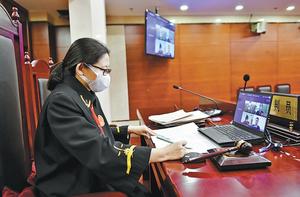 Judge Zhang Yan holds an online hearing at Beijing Chaoyang District People's Court. (CAO LU / FOR CHINA DAILY)
Judge Zhang Yan holds an online hearing at Beijing Chaoyang District People's Court. (CAO LU / FOR CHINA DAILY)
With people told to stay at home to help contain the disease, Chinese courts are working to improve their online systems to meet the demand for hearings that involve litigation.
Beijing High People's Court has demanded that courts throughout the capital guide the public and attorneys in accessing litigation, including case filing, paying fees, contacting judges, mediation and attending hearings. With legal service centers at all courts in the city ordered to be closed temporarily due to the outbreak, the court has issued guidance through its 12368 hotline and its online hearings platform.
From Feb 3 to Feb 27, some 10,282 cases were filed in cyberspace and the online platform was used 6,608 times, according to the court.
Wang described the trend to hear more cases online as "efficient and convenient". He added that it had also encouraged many courts to become more technology-friendly and to learn from the online experiences at the nation's internet courts in Beijing, Hangzhou, capital of Zhejiang province, and Guangzhou, capital of Guangdong province.
But he said it is not practical to extend this mode of holding hearings to courts nationwide, as not all cases are suitable for hearing online.
Ren said that as there is no unified access to online hearings and many courts' platforms are still at an early stage of development, she has concerns over extending online use. "Several issues, such as how to guarantee data security and keeping hearings in order, need to be studied further," she said.
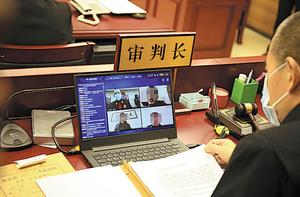 Guo Lijun, vice-president of Beijing Shunyi District People's Court, mediates a contract dispute online. (HAN SUSHUANG / FOR CHINA DAILY)
Guo Lijun, vice-president of Beijing Shunyi District People's Court, mediates a contract dispute online. (HAN SUSHUANG / FOR CHINA DAILY)
Approval obtained
Conducting hearings online during the outbreak has not only helped lawyers, it has made life easier for some judges.
On Feb 4, Chen Shi, a judge at Beijing No 1 Intermediate People's Court, finished hearing a private loan dispute through an online platform via video link.
"The platform ensured public health and safety during the outbreak," Chen said, adding that thanks to it, several of her cases had been completed promptly, instead of being delayed.
She said a lawyer for one litigant traveled to the Ningxia Hui autonomous region. "If he had returned to the capital to attend the hearing, he would have been quarantined for at least 14 days, meaning that the hearing might not have started on time," she said.
Before she started the hearing, she obtained the litigants' approval to use the platform and told them how to download an app on a smartphone or install software on a computer. "The installation was easy and only took about two or three minutes," she added.
On Feb 24, a dispute over compensation following a traffic accident was heard online by Kuancheng District People's Court in Changchun, capital of Jilin province. The plaintiff asked for 6,710 yuan (US$957), with both parties agreeing to take part in the hearing online, according to a statement issued by the court.
With sufficient evidence provided, the case was not complicated and was heard through the Yunjian app after the online court address was sent to both parties by text message.
Four days earlier, a court in the Xincheng district of Changchun held its first online hearing. "We made a lot of preparations to be assured of technical support during the case," judge Wang Xiaolei said.
Liu Chun, another lawyer from the Zhongwen Law Firm, suggested that attorneys prepare well before taking part in online hearings, in particular checking their laptop battery and internet connection.
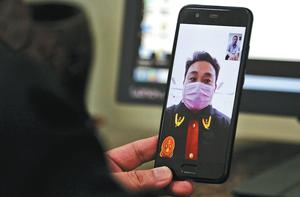 Liang Fangquan, a judge at Zaozhuang Intermediate People's Court in Shandong province, checks an identity before an online hearing. (SUN ZHONGZHE / FOR CHINA DAILY)
Liang Fangquan, a judge at Zaozhuang Intermediate People's Court in Shandong province, checks an identity before an online hearing. (SUN ZHONGZHE / FOR CHINA DAILY)
Guideline issued
On Feb 18, the Supreme People's Court, the nation's top court, issued a guideline as more courts across the country moved to hear cases online.
The guideline stated that courts nationwide must make full use of the 12368 hotline and online platforms to guide litigants in filing cases, in mediation, exchange of evidence, case hearings, announcing rules and delivering verdicts.
Courts should not allow litigants to provide physical versions of case material if they have submitted this online, according to the guideline, which also stated that hearings in cyberspace could only proceed with litigants' approval.
In addition, holding a hearing online depends on how complicated a case is and whether a court has the requisite technical expertise, according to the guideline.
For example, civil, commercial and administrative disputes can be heard online in general. However, cases in which the litigants disagree or where courts consider there is a need for further verification of the litigants' identities or face-to-face reviews of evidence, are excluded.
Courts can use online remote systems to question defendants in criminal cases, to announce judgments or to deal with commuting sentences or granting parole, but whether there is an urgent need for cases to be resolved in this way should be considered before such a hearing takes place, the top court said in the guideline.
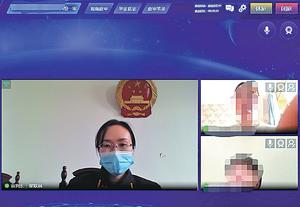 Judge Liang Lianlin mediates a contract dispute in an online hearing at Beijing Tongzhou District People's Court. (BU YANBING / FOR CHINA DAILY)
Judge Liang Lianlin mediates a contract dispute in an online hearing at Beijing Tongzhou District People's Court. (BU YANBING / FOR CHINA DAILY)
A court must not force litigants to take part in an online hearing, and legitimate applications for hearings to be delayed should be permitted, the top court said. It added that online litigation must only be conducted by video link, not audio, and should be recorded by each court.
Dong Bingbing, a judge from Shushan District People's Court in Hefei, Anhui province, who has heard several cases online, said, "Not all disputes are suitable to be heard in cyberspace."
He said such hearings are better for dealing with straightforward lawsuits, not those that are more complex. "Complicated disputes require litigants to offer a significant amount of evidence still need to be postponed until the outbreak is over," he said.
Landmark moves
In August 2017, the nation's first internet court was established in Hangzhou, followed a year later by those in Beijing and Guangzhou.
The three courts are responsible for hearing internet-related disputes, including online shopping contracts, loans and copyright infringements, according to a judicial interpretation by the top court.
Legal procedures, such as filing, hearing and following cases, exchanging evidence and delivering verdicts can be carried out online by these three courts, meaning that litigants and lawyers no longer need to go to bricks-and-mortar courts to deal with disputes.
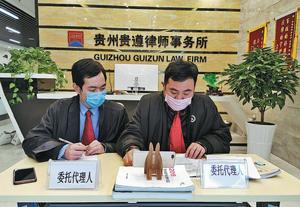 Lawyers in Zunyi, Guizhou province, take part in an online hearing at a court in Puyang, Henan province. (ZHANG SHAOMING / FOR CHINA DAILY)
Lawyers in Zunyi, Guizhou province, take part in an online hearing at a court in Puyang, Henan province. (ZHANG SHAOMING / FOR CHINA DAILY)
As of Oct 31, more than 80,000 cases had been conducted in online courts, with each one lasting about 45 minutes on average and the entire litigation process taking about 38 days, according to a report issued by the top court in December.
The outbreak has triggered discussion about online litigation among legal professionals, with some saying that to limit the flow of people, more courts are being pushed to hear cases on the internet.
However, Wang said that in hearing such cases, the internet courts currently operating shoulder more responsibility for exploring ways to regulate internet behavior, governing cyberspace by rule of law and simplifying the process for litigants.
For example, in June, Zhang Wen, president of the Beijing Internet Court, resolved a dispute over unpaid fees that involved faking the number of online views.
Zhang said she initially thought this case was just an online service contract dispute. "But on hearing it, I deemed the contract invalid and illegal, as falsifying views had damaged the public interest and disturbed order on the internet."
The number of views can help netizens better access an online service, product or platform. "Faking views in this case is a kind of fraud, misleading users and bringing disorder to the online business environment," Zhang said.
Ren, the Beijing lawyer, added that some legal services can be accessed online, such as filing and following cases, "but face-to-face hearings still need a sense of ceremony to ensure dignity of the rule of law and accuracy in case handling".


